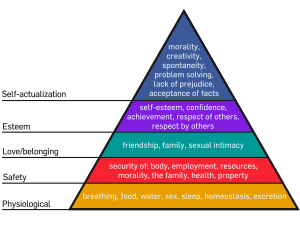The priority for this group at the bottom of this chart is
breathing , food , water, sex, sleep, homeostasis and escretion. Maslow’s
hierarchy of needs works on the basis that individuals start at the bottom and
work on getting their way up the chart. So once the bottom needs have been
satisfied, the individual starts working on the next level above, summarized as
safety. This goes on until the individual achieves the top level of self
actualization.
The poor will suffer more than the rich with climate change.
The reason is that the poor live life on the margin. They are more at risk of
being affected by floods and droughts. The poor are less able to absorb the
increases in food prices. A small increase in food price will represent a huge
proportion of their income.
So what has happened? Land which used to grow food is now
growing biofuels. The biofuels go into cars to reduce carbon output. Less food
produced has resulted in price increases in food. Why? Simple economics of the
law of supply and demand. When supply goes down the price of a product goes up
unless there is reduced demand. Demand does not go down among the very poor as
their demand is already at subsistence levels.
The numbers of individuals living below the poverty line is difficult to imagine. Suffice to say that in Indonesia there are some 30 million living below the poverty line. This is almost half the population of the UK or approximately double the population of the Holland.
Poverty and Climate change are issues that have to be dealt
with. Climate change will not be resolved by the very poor.
Carbon produced by person
- 1 ton per year in Africa
- 12.8 tons per year in the UK
- 28.5 tons per year in the United States
The priority for the poor is to eat and have their basic
needs satisfied. We cannot and should not expect the poor to resolve the
problems associated with carbon production and climate change.





No comments:
Post a Comment